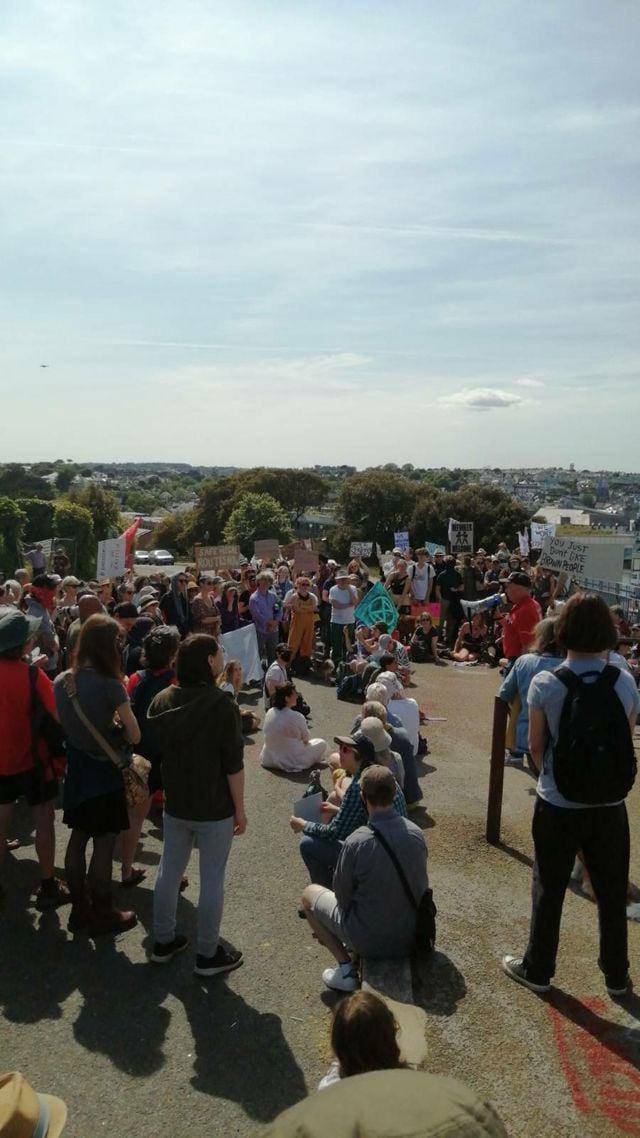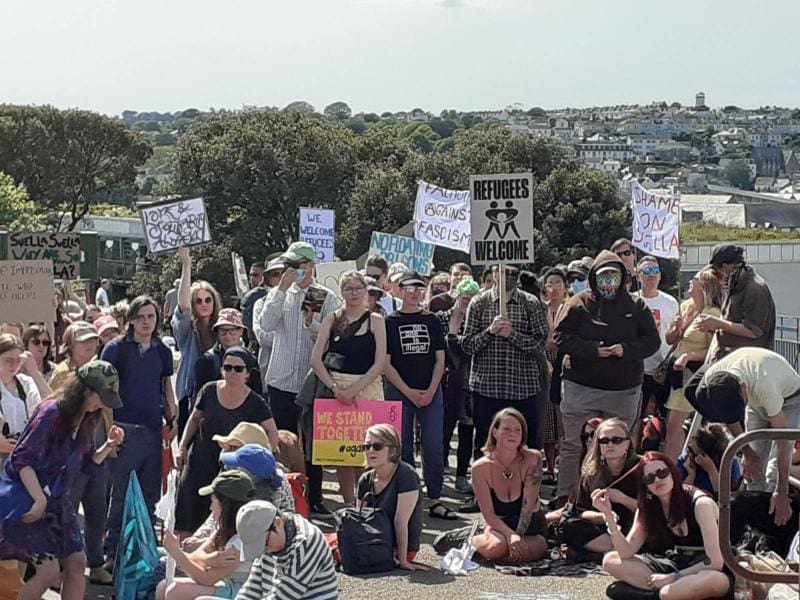People are sharing harrowing reports of overcrowded, unsafe and inhumane conditions inside Manston detention centre in Kent. Migrant solidarity groups are organising protests in support of detainees which are due to take place on Sunday 6 November.
Inhumane conditions inside Manston
On 31 November, MPs questioned home secretary Suella Braverman on whether she ignored legal advice and refused hotel bookings for migrants in Manston. The Home Office built the detention centre on a former military base in Kent. According to Morning Star reporter Bethany Rielly, the Home Office has instituted a military presence on site.
The Home Office is only supposed to hold people on the site for up to 24 hours. However, a prison watchdog warned that authorities are detaining people on the site for a much longer period, without beds, proper healthcare, or access to fresh air and exercise. The watchdog noted reports of cases of contagious diseases such as scabies, diphtheria and MRSA within the centre.
Grassroots migrant solidarity group SOAS Detainee Support visited the site on 31 October and reported witnessing “inhumane and overcrowded conditions”. Indeed, the site is dramatically over capacity. According to SOAS Detainee Support, Manston is hosting over 4,000 people, including children. However, it only has capacity for 1,000 people.
The group witnessed families sleeping on the floor for weeks on end and children crying for help. And although it’s unlawful for authorities to confiscate asylum-seekers’ phones, SOAS Detainee Support says that authorities have confiscated the mobile phones of detainees and denied them access to lawyers.
Sharing images and footage of the site visit, SOAS Detainee Support tweeted:
Desperately seeking help
Meanwhile, Stop Deportations shared the following, documenting the wristbands that people detained within Manston are forced to wear:
SOAS Detainee Support noted that this use of identification tags is “a chilling hallmark of internment camps throughout history”.
Writer and migrant and refugee rights campaigner Benny Hunter shared a photo of a letter thrown to the media by a child held inside Manston. Calling for urgent help, the letter claims that pregnant and unwell people inside the centre aren’t receiving the healthcare they need:
Anti-refugee Britain
On 1 November, home secretary Suella Braverman told parliament that there’s an “invasion on our southern coast“. This was in reference to people making dangerous channel crossings seeking safety in the UK. She made this callous and divisive remark the day after a man fire-bombed a migrant detention centre in Dover, injuring two people. Highlighting that racist and xenophobic violence doesn’t happen in a vacuum, writer Taj Ali shared:
Meanwhile, also on 1 November, the Home Office abandoned a group of people in central London after evacuating them from the Manston holding site. Authorities left the group of around 50 asylum seekers in a street outside Victoria station. They were stranded overnight without food, accommodation or warm clothing. Responding to the news, Zoe Gardner, who works in policy and research for the European Network on Statelessness, tweeted:
These incidents reveal the violent and oppressive nature of the border regime. It seeks to criminalise, scapegoat and dehumanise those seeking safety. Meanwhile, the individuals and institutions that are actually responsible for the crises we face amass wealth and power.
Resisting the border regime
People gathered outside the gates of the detention centre in Manston on 2 November, in solidarity with those held inside. BBC reporter Simon Jones shared footage of protesters singing “we are all human, we all deserve respect”:
According to Jones, while protesters blocked the detention centre’s entrance, others delivered toys for the children locked inside.
Action Against Detention and Deportations, a coalition of anti-border groups, is leading a protest in solidarity with those inside Manston on Sunday 6 November:
The group is arranging travel to the detention site from London. Those who can’t make it on the day are invited to contribute towards travel costs.
Migrant solidarity groups are also seeking mobile phone donations to give to those locked inside Manston. The devices are urgently needed in order to contact lawyers and family members. Sharing information on how to contribute to the phone drive, grassroots group Lesbians and Gays Support the Migrants tweeted:
Meanwhile, No Borders Manchester is leading a solidarity protest in the Northwest:
As always, those exercising their right to protest on Sunday should come prepared. Civil liberties organisation Liberty shared:
People can find more detailed information, as well as location-specific downloadable bustcards, on Green & Black Cross’s website.
Those who are unable to make it to the protests on Sunday can still get involved by contributing towards travel costs and the phone drive. You can also support the work of grassroots groups resisting borders and migrant oppression. These include Lesbians and Gays Support the Migrants, Stop Deportations, Kent Refugee Action Network and the Anti Raids Network.
This goes beyond Marston. This is about challenging the entire inhumane border regime which surveils, polices, detains, deports and dehumanises people seeking safety in the UK and globally.
Featured image via Simon Jones – Twitter
By Sophia Purdy-Moore
This post was originally published on Canary.


 (@RefugeeTogether)
(@RefugeeTogether)  (@DanielYorkLoh)
(@DanielYorkLoh) 
 If you can donate a phone by dropoff or post, please get in touch with AADD.procurement@gmail.com for details
If you can donate a phone by dropoff or post, please get in touch with AADD.procurement@gmail.com for details M2 3AA
M2 3AA SAVE these legal advice cards
SAVE these legal advice cards SHARE with other protesters
SHARE with other protesters WRITE phone numbers on your arm
WRITE phone numbers on your arm FIND Legal Observers for assistance
FIND Legal Observers for assistance 

